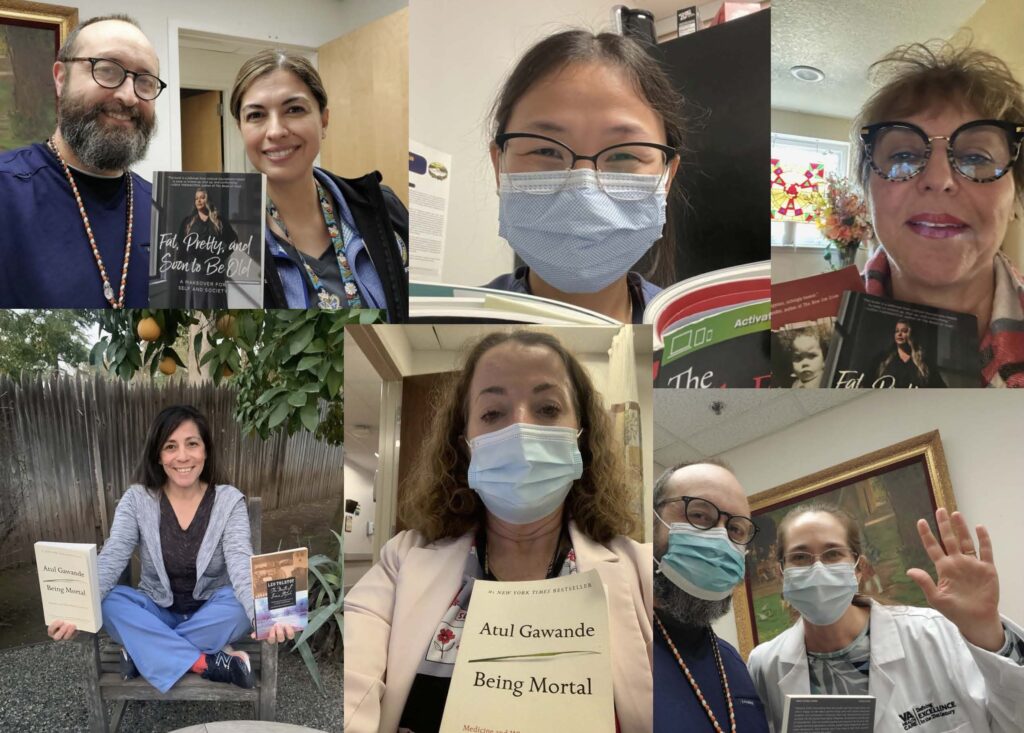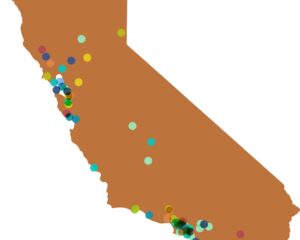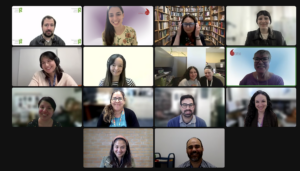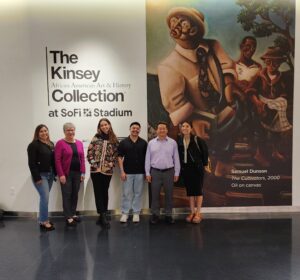Above: 2023 Literature and Medicine participants. Credit: Carolyn Cusick.
Since 2010, California Humanities has presented Literature & Medicine, a humanities-focused professional development program for healthcare providers at Veteran’s Affairs Medical Centers in Fresno, San Francisco, Sacramento, Palo Alto, and at the Kaiser Los Angeles Medical Center.
Literature & Medicine aims to improve the quality of health care services delivered to patients by offering health care providers the time, resources, and support to read and discuss works of literature. To reach this aim, our participating sites take part in a series of monthly facilitated reading and discussion sessions exploring works literature that connect with their work as caregivers.
The impact of Literature & Medicine is unique to each participant, but cumulatively our program partners and site facilitators have reported that taking part in Literature & Medicine has resulted in greater understanding among participants, increased awareness, and knowledge of oneself, others, and greater connection to their field of practice.
To learn more about the about the program firsthand, we caught up with Lori Williams, our site partner at the Fresno Veterans Affairs Medical Center, and Carolyn Cusick, PhD, our discussion facilitator at this site.
Lori, tell us about yourself, and your role as the site liaison and Literature & Medicine participant. How did you learn about this program?
I discovered Lit&Med on the VA weekly events calendar and have been a member for several years: first with former discussion facilitator Kris and now with Carolyn. When the prior liaison retired, I replaced her. My role is to seek permission from executive leadership for Lit&Med, locate a COVID appropriate space, advertise the program and keep our members abreast of dates, authors, and books. When food was allowed, I helped arrange our meal. It’s fun!
Carolyn, tell us about yourself, and your role as a Literature & Medicine facilitator. Does your work as an educator inform your approach to working with healthcare professionals?
As the facilitator of the program, I select the readings and lead the monthly discussion. By lead, I mean that I first offer a glimpse into the context of that month’s reading(s) and how I think it all fits into the theme of the season, and then pose some questions to the group to get the discussion started. I try to let the group share with one another, while having a researched set of themes, topics, and questions to pull from if we veer too far afield from our purpose. In reality, I find myself often so excited by the conversation that I talk probably more than I should.
In classrooms where I am the Professor – of Philosophy – I tend to hide my own view, representing the best interpretation of an assigned reading that I can while encouraging students to develop their own criticisms and overall viewpoints. I have plenty of control just in the construction of the syllabus, and I need students to trust that my grading is based not on my opinion but on their work. I teach thinking, not thoughts. Without grades in Literature & Medicine I let a little more of myself show up in the room. Because I have such a different area of expertise and set of skills and learn so much from the participants, I don’t mind sharing more from my perspective, especially when it can help further reveal their shared experiences in the field of healthcare and how that changes based on differing roles or perspectives.
Nonetheless, my work as an educator informs a lot of what I do in the program. Philosophy classrooms are places where a diverse group of people discuss big questions, aided by everyone having done difficult readings and where individuals also develop awareness and make connections with others. The value of that work is at the core of what Literature & Medicine is all about.
Lori and Carolyn, what has been your favorite part of taking part in this program?
Lori: Discovering the vast interpretations of the material. We have members with deep knowledge of the many authors and the symbolism in their work. Others have career paths and experiences which provide various opinions and understanding of the material. After every session, I take away a new perspective.
Taking part in this program has energized me and reminded me of how much more I gain from reading in community with others.
Carolyn Cusick
Carolyn: The program has reignited my love of reading. I’m reading more and more variety, regularly imagining ways books can fit into a theme for a season or imagining the great conversations that could be had with others. Taking part in this program has energized me and reminded me of how much more I gain from reading in community with others.
Lori and Carolyn, what has been your favorite book to read or share with the group?

Lori: Being Mortal by Atul Gawande. My mother lives in a senior facility here in Fresno. The book introduces how the facilities came about, where they are now, and how they could be. It also addressed appropriate treatment of seniors and those with life-threatening illnesses. It was well-written and allowed for a fantastic discussion.
Carolyn: The book that has had the widest and most lasting impact on me has been Atul Gawande’s Being Mortal. Part of this impact has been the result of sharing it with others not only in the group but external to it, who also report back to me about the impact it has had on them and others they share it with. But being able to discuss that book with healthcare professionals gives back in richer ways that I could get on my own as a philosopher and regular person.
Lori and Carolyn, what has been the most surprising thing about taking part in this program?
Lori: It’s always interesting to see how Carolyn keeps the books loosely related to healthcase and ties them together by the season’s end. I have developed new and lasting friendships while reading and discussing these books.
Carolyn: I see the dedication these healthcare professionals have for their jobs, despite what I am sadly surprised to learn of the increasingly cumbersome, and not necessarily effective, processes and mandates driven by the corporatization of medicine. Participants don’t show up to complain; they show up grateful for and invested in the meaningful conversations to be had about shared human experiences. And sometimes they connect with each other over difficulties on the job, but also sometimes they can suggest helpful possibilities in mere minutes.





